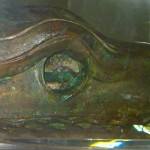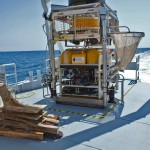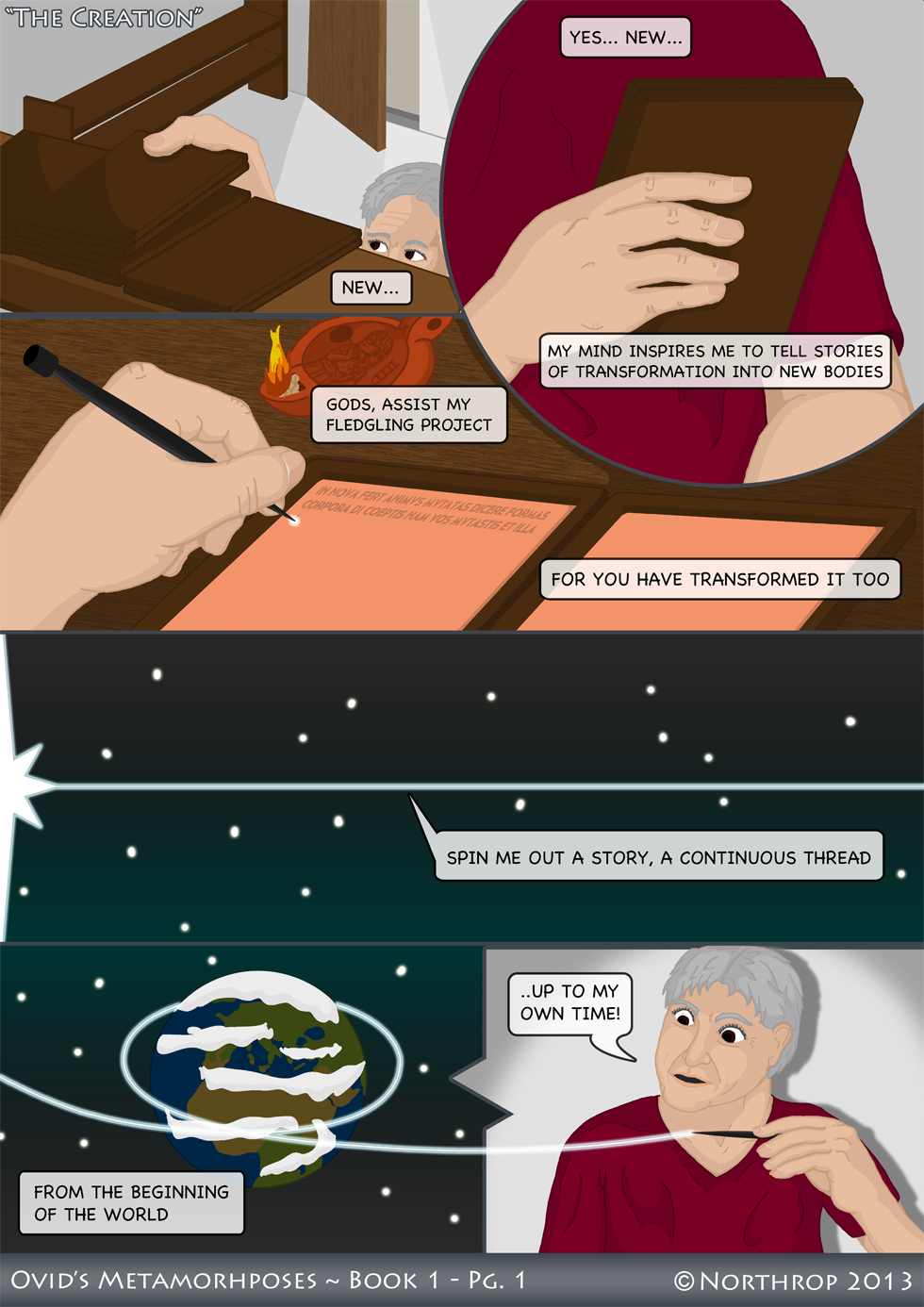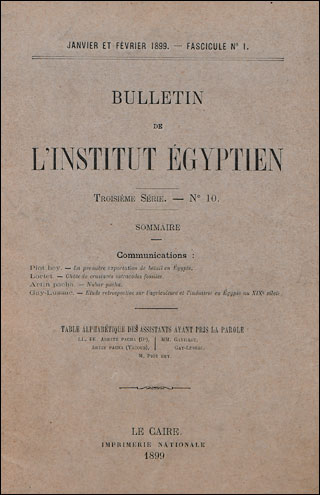Issue index:
Vol. 1, No 1: Romano-British Sites & Museums I: Forts and military sites; Late Iron Age Celts; Angkor Wat; Peter Martyr.
Vol. 1, No 2: Romano-British Sites & Museums II: Towns, villas, markets, baths; New World Voyages of William Dampier.
Vol. 1, No. 3: New World Explorers I: South America & Caribbean; Vikings in Vinland; Rivers from Space.
Vol. 1, No. 4: Sites & Museums in Roman Gaul I; Thracian Treasures; Buddhist Monasteries in Tibet.
Vol. 2, No. 1: New World Explorers II: Yucatán; Great Basin
Archaeology.Vol. 2, No.2: Maya Lowlands: Tikal, Palenque; Egyptian papyri; Sutton Hoo.
Vol. 2, No.3: Romans
on the Danube; Viking ships and sagas; Andean Petroglyphs.Vol. 2, No.4: Neanderthals Meet Modern Humans.
Vol. 3, No.1: Byzantine Cultures, East and West; Buried silk road cities of Khotan.
Vol. 3, No.2: New World Explorers III: Peopling of the Americas
Vol. 3, No.3: Minoan Palaces of Crete: New Interpretations; El Mirón Cave, Spain
Vol. 3, No.4: Rediscovering Lost Civilizations: Reports from the Field.
Vol. 4, No.1: Homo erectus: current findings on an early human ancestor; The prehistory of Sardinia
Vol. 4, No.2: The Flowering of the Gothic in Northern France: Gothic Art and Architecture from Paris to Picardie
Vol. 4, No.3: The Looting of Archaeological Sites: Looting and the Antiquities Market; Central America as a Case Study; Bering Strait Legal Market in Antiquities
Vol. 4, No.4:
Imperial China
Wednesday, November 30, 2016
Open Access Journal: Athena Review
Athena Review: Journal of Archaeology, History, and Exploration
ee AWOL's full List of Open Access Journals in Ancient Studies
Europeana EAGLE Project Stories
Europeana EAGLE Project Stories
In the EAGLE project, we believe that every inscription has a story to tell! It is thanks to inscriptions that we are informed of several details of the every-day life in Antiquity; inscriptions can be used to open a window on our past and start a fascinating journey among men that lived in Europe thousands of years ago. For instance, would you like to know how people used to celebrate victories in the most important national athletic and cultural competitions of Athens? Or how dangerous it was to cross the Alps travelling from Italy to the city of Emona (actual Slovenia) in the Roman times?
This is the kind of stories that we’d like to collect from our audience, and this is where our Storytelling App comes to help! A story is a narrative that can be enhanced by all the multimedia content that can help the readers (especially the non-specialists) understand and contextualize the words of the text. Furthermore, we should never forget that an inscription is a beautiful multimedia object! Therefore, we want to enable our authors to insert pictures and other representations to help your audience imagine what the visual impact of the inscribed monument was and still is.
Lucio da Treviri
*** [D(is) M(anibus)] et memoriae aetern(ae) L(uci) Secundius Octavi Treveri acerbissima morte defuncti qui cum ex incendio seminudus effugisset posthabita[...]read Story»An Inscription in Daglingworth
In August 2013 we went looking for some inscriptions among which this one. Getting to the place wasn’t easy. But we arrived[...]read Story»The Trophy of the battle of Platea
Sulthanamet Square in Istanbul hosts part of one of the most important monuments survived from ancient times: the trophy of the[...]This is the story of a young quaestor, Lucius Quinctius, who held the post during the first Punic War.[...]Lucio Cassio Filippo, his wife Atilia Pomptilla together with Filippo’s father were exiled to Sardinia by the Emperor Nero, probably because they were opponents of his power. They spent their lives in Karalis (modern Cagliari). Pomptilla and Filippo, in spite of their condition, lived happily together for 42 years, unfortunately Filippo fell seriously ill during the exile (because of malaria, a common disease because of the unhealthy environment in some places of the ancient Sardinia) and his faithful wife, so in love with him, asked the Gods to let her die instead of her husband. Even if it seems impossible, her prayers were fulfilled: Filippo healed and she suddenly died as in the myth of Alcestis. Filippo also died a little later and his ashes were preserved close to his wife’s. The incredible story of this love is witnessed by the inscriptions of the so called “Viper’s Cave”.
Tuesday, November 29, 2016
Open Access Egyptology: Thotweb
Thotweb was created in 1997 by a group of fellow students in egyptology. Its aim is to help spreading egyptological information throughout the world and to stimulate international cooperation.
At the time being, most of it is in french, but it will be eventually translated into english, except for the research articles, which will remain in their original languages.
Its main divisions are :
Contents | Portal | Encyclopedia | Virtual tour | Professional | Forum | Library | News | TravelOur "Portal" is one of the biggest of the egyptological web. Continuously updated, it features pages, that means that a web site can be listed several times according to its content. This thematic approach makes it very useful. The sub-divisions of our portal are:
Egyptological societies | Databases | Forums | News | Multimedia & softwares | Institutions and research centres | Ancient egyptian language and inscriptions | Publishing and bookshops | Excavations and sites | Museums | Top 5 | Personal pagesOur "Encyclopedia" is for the layman and the egyptologist alike. It has short notices and articles, with links to relevant egyptian inscriptions in adobat pdf format. For instance, someone interested in the reign of king Ahmose will be able to download its great inscription in Karnak, the autobiography of Ahmose, son of Abana, and the donation stela of queen Ahmose-Nefertary. It is like a virtual library at your disposal.
We also produce CD-Rom reeditions of ancient and useful egyptological books. They are in our "Library" section.
The aim of our "Virtual tour" is to provide photographs of archaelogical sites. They are rationnaly classified, according to the numerotation and the maps of the "Porter and Moss". It takes time to make it. If you want to share your photographs too, you are quite welcome.
The "Professional" section presents research works, interviews, and lists hundreds of academic researches. If you are writing a Ph.D which is not listed, please contact us.
We also host a "Forum", in fact a discussion list, and you are welcome to join.
Our "News" are also regularly updated, and provide information on discoveries and symposiums alike.
Lastly, our "Travel" section, still under development, will present some facts helping to arrange travels to Egypt.
I hope you will find Thotweb useful. Don't hesitate to let me know of any criticism or remarks you might like to do.
Call for Participants: Editing biographies of women classicists
Wikipedia Editathon
Wikipedia currently hosts around 200 biographies of classicists, of which only approximately 10% are of women. This WCC initiative is taking steps towards redressing this gender imbalance, by training and encouraging classicists to edit Wikipedia with this focus.
We are offering a free face-to-face training event and editathon, supported by Wikimedia UK, to launch a programme of more informal remote editing sessions. This launch event will take place at the Institute of Classical Studies (ICS), Senate House, Malet Street, London WC1E 7HU, from 10.30-17.30 on 23rd January 2017.
Thanks to the generous sponsorship of the ICS this event is free to attend, with lunch and coffee provided. Places are, however, limited, and registration is therefore essential. For those unable to travel to London, participation via Skype is also possible. Participants with disabilities are welcome; if you need particular support to enable you to take part, please let us know.
To reserve a place (either to participate in person or via Skype) and for further details please email the organisers, Claire Millington (claire.millington [at] kcl.ac.uk) and Emma Bridges (e.e.bridges [at] open.ac.uk) by 16th January 2017.
Ovid's Metamorphoses, by C. Northrup
Ovid's Metamorphoses
By C. Northrup
By C. Northrup
Hello! My name is Charlie and this is my comic! Well, it’s not entirely my comic… I am translating and adapting a 2000+ year old Latin poem called the Metamorphoses. It’s written by a real awesome dude named Ovid, who lived approximately 43 BCE – 17/18 CE – so, really, he should get the writing credit… I’ve modified some things here and there, so I will always post the corresponding lines of the poem below, along with my translation. (Latin nerds: feel free to email me and criticise my translation!) It is my stated goal to remain as faithful to the poem as possible, but I do like to make it accessible to modern audiences at the same time. So, check the Latin and throw something at me if I deviate too far!
I’m also doing a little PhD dissertation on this poem, so I will gush about the poem and the context below, if you fancy a gander at my ramblings…
Archives
Categories
Open Access Journal: Bulletin de l'Institut Egyptien
[First posted in AWOL 2 December 2012, updated 29 November 2016]
Bulletin de l'Institut Egyptien
Bulletin de l'Institut Egyptien
1.Ser. 1 (1859) 1.Ser. 2 (1859) 1.Ser. 3 (1860) 1.Ser. 4 (1860) 1.Ser. 5 (1861)1.Ser. 6 (1861)1.Ser. 7 (1862)
1.Ser. 8 (1862-1863)
1.Ser. 9 (1863-1864-1865)
1.Ser. 10 (1866-1867-1868)
1.Ser. 11 (1869-1871)
1.Ser. 13 (1874-1875)
4.Ser. 1-2 (1900-1901) 4.Ser. 3-4 (1902-1903) 4.Ser. 5-6 (1904-1905) 4.Ser. 7 (1906)5.Ser. 1-2 (1907-1908) 5.Ser. 3-4 (1909-1910) 5.Ser. 5-8 (1911-1914) 5.Ser. 9-10 (1915-1916) 5.Ser. 11-12 (1917-1918)6.Ser. 1-2 (1918-1920) 6.Ser. 3-4 (1920-1922) 6.Ser. 5-7 (1922-1925)
See AWOL's full List of Open Access Journals in Ancient Studies
Monday, November 28, 2016
Open Access Publications from the Institut français du Proche-Orient
[First posted in AWOL 26 February 2014, updated 28 November 2016]
Collections électroniques de l’Ifpo - Livres en ligne des Presses de l’Institut français du Proche-Orient
Collections électroniques de l’Ifpo - Livres en ligne des Presses de l’Institut français du Proche-Orient
Les Presses de l’Institut français du Proche-Orient assurent la diffusion et la valorisation des recherches menées au sein des territoires scientifiques investis par l’Institut dans les sociétés du Proche-Orient (la Syrie, le Liban, la Jordanie, les territoires palestiniens, l’Irak) dans l’ensemble des disciplines des sciences humaines et sociales depuis l’antiquité jusqu’à nos jours.
Au rythme d’une production annuelle d’une quinzaine de titres (auxquels il faut ajouter les coéditions), les publications de l’Ifpo continuent de développer des collections fortes d’un fonds de près de 400 titres existant depuis 1922 et héritier de l’histoire de la recherche française au Proche-Orient.
Les Presses de l’Ifpo recourent régulièrement à la coédition en partenariat avec des maisons d’édition privées (Actes Sud, Khartala, Economica-Anthropos) ou d’autres instituts de recherche (Orient Institut, CNRS Liban) pour conduire ses projets d’édition.
Les élites bagdadiennes au temps des Seldjoukides
Étude d’histoire sociale
Vanessa Van Renterghem2015…Délibérer sous la coupole
L’activité parlementaire dans les régimes autoritaires
Baudouin Dupret and Jean-Noël Ferrié2014…Formation, qualification, métiers. Évolution du marché de l’emploi et information sur les métiers
Actes de la table-ronde tenue à Beyrouth les 21 et 22 mai 2012
Élisabeth Longuenesse (dir.)2014…Développer en Syrie
Retour sur une expérience historique
Élisabeth Longuenesse and Cyril Roussel (dir.)2014…Alep et ses territoires
Fabrique et politique d’une ville (1868-2011)
Jean-Claude David and Thierry Boissière (dir.)2014…Les ondes de choc des révolutions arabes
M’hamed Oualdi, Delphine Pagès-El Karoui and Chantal Verdeil (dir.)2014…Des banlieues à la ville
Espaces et acteurs de la négociation urbaine
Élisabeth Longuenesse and Caecilia Pieri (dir.)2013…Les non-dits du nom. Onomastique et documents en terres d'Islam
Mélanges offerts à Jacqueline Sublet
Christian Müller and Muriel Roiland-Rouabah (dir.)2013…Abd el-Kader, un spirituel dans la modernité
Ahmed Bouyerdene, Éric Geoffroy and Setty G. Simon-Khedis (dir.)2012…Territoires, architecture et matériel au Levant
Doctoriales d’archéologie syrienne. Paris-Nanterre, 8-9 décembre 2011
2012…Les maîtres soufis et leurs disciples des IIIe-Ve siècles de l'hégire (IXe-XIe)
Enseignement, formation et transmission
Geneviève Gobillot and Jean-Jacques Thibon (dir.)2012…Le Bilād al-Šām face aux mondes extérieurs
La perception de l’Autre et la représentation du souverain
Denise Aigle (dir.)2012…Les stratégies narratives dans la recension damascène de Sīrat al-Malik al-Ẓāhir Baybarṣ
Francis Guinle2011…Villes, pratiques urbaines et construction nationale en Jordanie
Myriam Ababsa and Rami Farouk Daher2011…La gent d’État dans la société ottomane damascène
Les ‘askar à la fin du xviie siècle
Colette Establet and Jean-Paul Pascual2011…Métamorphose des figures du leadership au Liban
Champs et contrechamps des élections législatives de 2009
Myriam Catusse, Karam Karam and Olfa Lamloum (dir.)2011…Patrimoines en situation. Constructions et usages en différents contextes urbains
Exemples marocains, libanais, égyptien et suisse
Raffaele Cattedra, Pascal Garret, Catherine Miller et al. (dir.)2010…Returning to Political Parties?
Partisan Logic and Political Transformations in the Arab World
2010…Fondations pieuses en mouvement
De la transformation du statut de propriété des biens waqfs à Jérusalem (1858-1917)
Musa Sroor2010…La grande peste en Espagne musulmane au XIVe siècle
Le récit d’un contemporain de la pandémie du XIVe siècle
Aḥmad bin ‘Alī bin Muḥammad Ibn Ḫātima[Abū Ǧa‘far Ibn Ḫātima al-Anṣārī]2010…Maaloula (XIXe-XXIe siècles). Du vieux avec du neuf
Histoire et identité d’un village chrétien de Syrie
Frédéric Pichon2010…Les faubourgs de Damas
Atlas contemporain des faubourgs anciens. Formes, espaces et perspectives
Yves Roujon and Luc Vilan2010…Stratégies d'acquisition de l'eau et société au Moyen-Orient depuis l'Antiquité
Mohamed Al-Dbiyat and Michel Mouton2009…Les quartiers irréguliers de Beyrouth
Une histoire des enjeux fonciers et urbanistiques dans la banlieue sud
Valérie Clerc-Huybrechts2008…Armées et combats en Syrie de 491/1098 à 569/1174
Analyse comparée des chroniques médiévales latines et arabes
Abbès Zouache2008…De la théorie à l’usage
Essai de reconstitution du système de la métrique arabe ancienne
Bruno Paoli2008…ONG palestiniennes et construction étatique
L’expérience de Palestinian Agricultural Relief Committees (PARC) dans les Territoires occupés palestiniens, 1983-2005
Caroline Abu-Sada2007…The grammars of adjudication
The economics of judicial decision making in fin-de-siècle Ottoman Beirut and Damascus
Zouhair Ghazzal2007…Itinéraires esthétiques et scènes culturelles au Proche-Orient
Nicolas Puig and Franck Mermier (dir.)2007…Bosra. Aux portes de l’Arabie
Jacqueline Dentzer-Feydy, Michèle Vallerin, Thibaud Fournet et al. (dir.)2007…Jean Gaulmier, un orientaliste
Recueil des textes publiés dans le Bulletin d’études orientales (1929-1972)
Jean Gaulmier2006…Le sacré et le salut à Antioche au IVe siècle apr. J.-C.
Pratiques festives et comportements religieux dans le processus de christianisation de la cité
Emmanuel Soler2006…Ǧurǧī Zaydān (1861-1914)
Écrivain réformiste et témoin de la Renaissance arabe
Anne-Laure Dupont2006…Spectateurs en dialogue
L’énonciation dans le théâtre de Sa‘dallah Wannous de 1976 à 1978
Batoul Jalabi-Wellnitz2006…Les pèlerinages au Maghreb et au Moyen-Orient
Espaces publics, espaces du public
Sylvia Chiffoleau and Anna Madœuf (dir.)2005…Le jardinier et le citadin
Ethnologie d’un espace agricole urbain dans la vallée de l’Oronte en Syrie
Thierry Boissière2005…Penser l'Orient
Traditions et actualité des orientalismes français et allemand
Youssef Courbage and Manfred Kropp (dir.)2004…Sidon et la Phénicie méridionale au Bronze récent
À propos des tombes de Dakerman
Roger Saïdah2004…France, Syrie et Liban 1918-1946
Les ambiguïtés et les dynamiques de la relation mandataire
Nadine Méouchy (dir.)2002…Études sur les villes du Proche-Orient XVIe-XIXe siècles
Hommage à André Raymond
Brigitte Marino (dir.)2001…La vie littéraire dans l’Espagne musulmane sous les Mulūk al-Ṭawā’if
Ve/XIe siècle
Afif Ben Abdesselem2001…L’époque des premiers bourgs fortifiés
Pertinence de l’existence d’un processus d’urbanisation dans le Levant sud au troisième millénaire
Christophe Nicolle1999…Reconstruction et réconciliation au Liban
Négociation, lieux publics, renouement du lien social
Eric Huybrechts and Chawqi Douayhi (dir.)1999…Antonin Jaussen, sciences sociales occidentales et patrimoine arabe
Géraldine Chatelard and Mohammed Tarawneh (dir.)1999…Autobiographie d’un clerc chiite du Ǧabal ‘Āmil
Tiré de : Les notables chiites (A‘yān al-šī‘a)
Muḥsin Al-Amīn1998…Le faubourg du Mīdān à Damas à l’époque ottomane
Espace urbain, société et habitat (1742-1830)
Brigitte Marino1997…La politique extérieure de la principauté de Damas (468-549 H / 1076-1154)
Mariam Yared-Riachi1997…Le soufisme en Égypte et en Syrie
Sous les derniers mamelouks et les premiers ottomans. Orientations spirituelles et enjeux culturels
Éric Geoffroy1996…Homs et Hama en Syrie centrale
Concurrence urbaine et développement régional
Mohamed Al-Dbiyat1995…Du Coran à la philosophie
La langue arabe et la formation du vocabulaire philosophique de Farabi
Jacques Langhade1994…Les lois des bâtiments
Voisinage et habitat urbain dans l’Empire romain. Recherches sur les rapports entre le droit et la construction privée du siècle d’Auguste au siècle de Justinien
Catherine Saliou1994…Familles et fortunes à Damas
450 foyers damascains en 1700
Colette Establet and Jean-Paul Pascual1994…Louis Massignon et l’islam
Place et rôle de l'islam et de l’islamologie dans la vie et l’œuvre de Louis Massignon
Pierre Rocalve1993…Damas et la Syrie sous la domination fatimide (359-468/969-1076). Deuxième tome
Essai d’interprétation de chroniques arabes médiévales
Thierry Bianquis1989…Communautés villageoises et migrations de main-d’œuvre au Moyen-Orient
Elisabeth Longuenesse, Gilbert Beaugé and Michel Nancy1986…Damas et la Syrie sous la domination fatimide (359-468/969-1076). Tome premier
Essai d’interprétation de chroniques arabes médiévales
Thierry Bianquis1986…Migrations et changements sociaux dans l’Orient arabe
André Bourgey, Philippe Gorokhoff, Michel Nancy et al.1985…Mouvements communautaires et espaces urbains au Machreq
Mouvements communautaires et espaces urbains au Machreq
Mona Zakaria and Bachchâr Chbarou (dir.)1985…Description de la Syrie du Nord
Traduction annotée de Al-A‘Lāq al-ḫaṭīra fī ḏikr umarā’ al-Šām wa l-Ǧazīra
‘Izz al-Dīn ibn Šaddād1984…Culture et éducation arabo-islamiques au Šām pendant les trois premiers siècles de l’Islam
D’après « Tārīẖ Madīnat Dimašq » d’Ibn ‘Asākir (499/1105 - 571/1176)
Malaké Abiad1981…Nūr ad-Dīn. Tome II
Un grand prince musulman de Syrie au temps des Croisades (511-569 H./1118-1174)
Nikita Elisséeff1967…Nūr ad-Dīn. Tome I
Un grand prince musulman de Syrie au temps des Croisades (511-569 H./1118-1174)
Nikita Elisséeff1967…Nūr ad-Dīn. Tome III
Un grand prince musulman de Syrie au temps des Croisades (511-569 H./1118-1174)
Nikita Elisséeff1967…Ibn ʿAqīl et la résurgence de l’islam traditionaliste au XIe siècle (Ve siècle de l’Hégire)
George Makdissi1963…Le Traité des divergences du ḥadīṯ d’Ibn Qutayba (mort en 276/889)
Traduction annotée du Kitāb ta’wīl muḫtalif al-ḥadīṯ
Ibn Qutayba1962…La critique poétique des Arabes jusqu’au Ve siècle de l’Hégire (XIe siècle de J.C.)
Amjad Trabulsi1956…Damas de 1075 à 1154
Traduction annotée d’un fragment de l’Histoire de Damas d’Ibn Al-Qalansi
Roger Le Tourneau1952…Series
- Études arabes, médiévales et modernes
- Contemporain publications
- Cahiers de l’Ifpo
- Bibliothèque archéologique et historique
- Co-éditions
- Guides archéologiques
- Ifpoche
- Colloques et journées d’études
- Cahiers du Cermoc (1991-2001)
- All books












































































































































